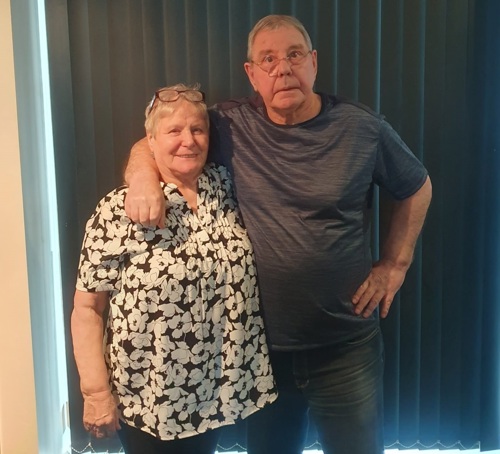Press release posted 17 April 2023
A new drug called sotorasib which was trialled as a treatment for advanced non-small-cell lung cancer (NSCLC) at The Christie NHS Foundation Trust in Manchester is now available on the NHS.
Sotorasib is a targeted treatment, specifically for patients whose lung cancer carries a mutation known as KRAS G12C. The role of KRAS mutations in driving cancers has been researched for over 40 years, yet scientists have found drug discovery and development in this field to be challenging. Sotorasib is the first KRAS inhibitor to be approved for standard use in the UK, making this a major milestone in lung cancer research.
Lung cancer is the third most common cancer and accounts for the highest number of cancer-related deaths in both men and women. NSCLC is the most common (80-85%) of all lung cancers and KRAS mutations occur in 25-30% of those patients. The KRAS G12C mutation affects 12% of NSCLC patients in the UK. Before targeted and personalised medicines became available, the 5-year survival rate for advanced NSCLC cases was just 5%.

Patients with KRAS G12C-positive NSCLC, who have received previous anti-cancer treatments, can now be prescribed sotorasib, a tablet anti-cancer treatment. Sotorasib binds to KRAS G12C in the cancer cell and makes it inactive, stopping cell division and preventing cancer growth.
The CodeBreak-200 study found that after 12 months of taking sotorasib or chemotherapy, 25% of patients on sotorasib experienced no cancer growth compared to only 10% who took the chemotherapy docetaxel, which previously was the standard treatment. The phase 3 clinical trial was run at the National Institute for Health and Care Research (NIHR) Manchester Clinical Research Facility (CRF) at The Christie.
Billy Moffatt, 73, from Beswick in east Manchester, who had previously been affected by prostate cancer, was diagnosed with lung cancer in April 2020 and given 18 months to live. He had surgery to remove the tumour in his lung in June 2020, but still needed further treatment. Wanting to avoid hospital visits during COVID, he was referred to The Christie where he initially was given chemotherapy. After some initial treatment, doctors identified that Billy had the KRAS G12C mutation in May 2022, making him suitable for sotorasib. After 10 months of receiving sotorasib, his cancer has been kept at bay and he isn’t experiencing any side-effects.
Billy Moffatt, a retired factory worker, who is married to Margaret, and has 6 grandchildren and 5 great grandchildren said: “I’m so glad I was given sotorasib. It has meant I haven’t had to undergo gruelling chemotherapy and it’s enabled me to have a far better quality of life. Taking the daily tablets means fewer trips to the hospital, so it’s much more convenient too.”
Sotorasib was approved for use in the NHS following a decision by NICE (The National Institute for Health and Care Excellence). An article about the trial which is co-authored by Dr Colin Lindsay, consultant medical oncologist at The Christie has been published in The Lancet.
Dr Colin Lindsay, consultant medical oncologist at The Christie, who led on the CodeBreak-200 clinical trial in the UK said: “This is a global game changer in the treatment of RAS mutation and stage 4 lung cancer, led by the team here in Manchester. We have been desperate to find a therapy that can help patients with cancers involving the KRAS mutation which affects so many cancer cases and has been known about as a key cancer driver for four decades Although there is currently no cure for stage 4 lung cancer, we were able to identify the KRAS G12C mutation in the cancer cells and the patient can take sotorasib to help extend their life.
"As sotorasib is taken orally, it can be taken at home, is better tolerated, whilst being more effective and giving better quality of life than docetaxel administered via a drip. It also works faster than chemotherapy, which is very important for our patients who can be poorly and need their tumours to shrink quickly. In the North-West we have a large population of patients that could benefit from this new drug, many of whom come from the deprived communities we serve.”
Amgen, one of the world’s leading independent biotechnology companies based in the US, funded CodeBreak-200 and is also the manufacturer of sotorasib.
